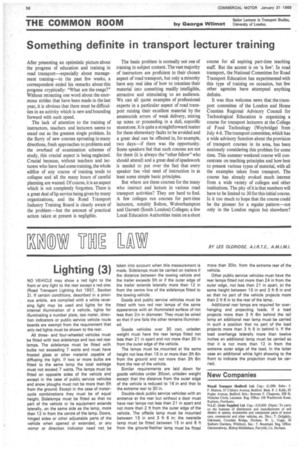Something definite in transport lecturer training
Page 60

If you've noticed an error in this article please click here to report it so we can fix it.
After presenting an optimistic picture about the progress of education and training in road transport—especially about management training—in the past few weeks, a correspondent ended his remarks about this progress cryptically: "What are the snags?" Without retracting one word about the enormous strides that have been made in the last year, it is obvious that there must be difficulties in an activity which is new and bounding forward with such speed.
The lack of attention to the training of instructors, teachers and lecturers seems to stand out as the greatest single problem. In the flurry of new courses sprouting in many directions, fresh approaches to problems and the overhaul of examination schemes of study, this crucial aspect is being neglected. Crucial because, without teachers and lecturers who have had some training, the whole edifice of any course of training tends to collapse and all the many hours of careful planning are wasted. Of course, it is an aspect which is not completely forgotten. There is a great deal of lip service being given by many organizations, and the Road Transport Industry Training Board is clearly aware of the problem—but the amount of practical action taken at present is negligible. The basic problem is normally not one of training in subject content. The vast majority of instructors are proficient in their chosen aspect of road transport, but only a minority have any real idea of how to translate their material into something readily intelligible, attractive and stimulating to an audience. We can all quote examples of professional experts in a particular aspect of road transport ruining their excellent material by the amateurish errors of weak delivery, mixing up notes or proceeding in a dull, soporific monotone. It is quite a straightforward matter for these elementary faults to be avoided and a great deal can be effected in, for example, two days—if there was the opportunity. Some speakers feel that such courses are not for them (it is always the "other fellow" who should attend) and a great deal of spadework is needed to put over the fact that every speaker has vital need of instruction in at least some simple basic principles.
But where are these courses for the many who instruct and lecture in various road transport activities? They are hard to find. A few colleges run courses for part-time lecturers, notably Bolton, Wolverhampton and Garnett (South London) Colleges; a few Local Education Authorities insist on a short course for all aspiring part-time teaching staff. But the accent is on 'a few'. In road transport, the National Committee for Road Transport Education has experimented with this type of training on occasion, but few other agencies have attempted anything definite.
It was thus welcome news that the transport committee of the London and Home Counties Regional Advisory Council for Technological Education is organizing a course for transport lecturers at the College of Food Technology (Weybridge) from July 4-6. The transport committee, which has a wide advisory function about the provision of transport courses in its area, has been anxiously considering this problem for some time. This summer weekend course will concentrate on teaching principles and how best to present various types of material, with all the examples taken from transport. The course has already evoked much interest from a wide variety of colleges and other institutions. The pity of it is that numbers will have to be limited to 30 for this initial course. Is it too much to hope that the course could be the pioneer for a regular pattern—not only in the London region but elsewhere?




































































































